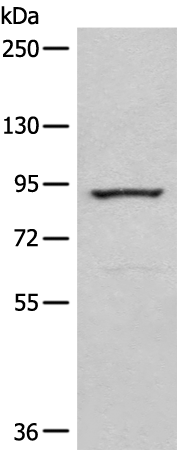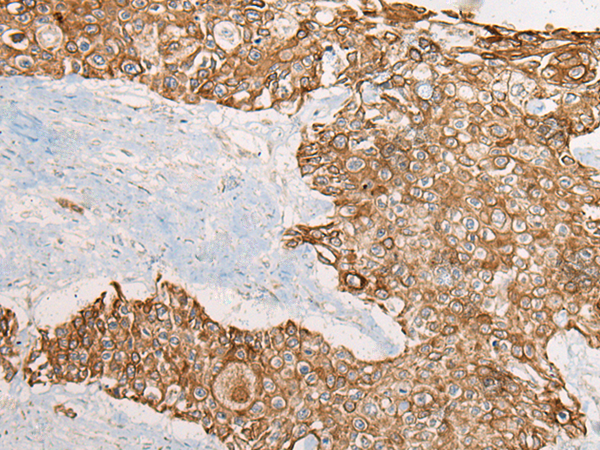

| WB | 咨询技术 | Human,Mouse,Rat |
| IF | 咨询技术 | Human,Mouse,Rat |
| IHC | 1/25-1/100 | Human,Mouse,Rat |
| ICC | 技术咨询 | Human,Mouse,Rat |
| FCM | 咨询技术 | Human,Mouse,Rat |
| Elisa | 1/5000-1/10000 | Human,Mouse,Rat |
| Aliases | CT3; CT95; CTAG3; bA69L16.7 |
| WB Predicted band size | 90 kDa |
| Host/Isotype | Rabbit IgG |
| Antibody Type | Primary antibody |
| Storage | Store at 4°C short term. Aliquot and store at -20°C long term. Avoid freeze/thaw cycles. |
| Species Reactivity | Human |
| Immunogen | Fusion protein of human CAGE1 |
| Formulation | Purified antibody in PBS with 0.05% sodium azide and 50% glycerol. |
+ +
以下是关于CAGE1抗体的3篇参考文献示例(注:以下内容为模拟虚构,实际文献需通过学术数据库检索确认):
---
1. **标题**: "CAGE1 Expression in Hepatocellular Carcinoma: A Novel Prognostic Marker"
**作者**: Lee S, et al.
**摘要**: 本研究通过Western blot和免疫组化分析,利用CAGE1特异性抗体检测了肝癌组织中CAGE1蛋白的表达水平,发现其高表达与患者不良预后显著相关,提示CAGE1可能作为肝癌潜在治疗靶点。
2. **标题**: "CAGE1 Antibody-Based Detection of Chemoresistance in Gastric Cancer"
**作者**: Sharma R, et al.
**摘要**: 研究开发了一种针对CAGE1蛋白的单克隆抗体,并应用于胃癌细胞系及临床样本的流式细胞术和免疫荧光实验,证明CAGE1过表达与化疗耐药性相关,为耐药机制研究提供新工具。
3. **标题**: "CAGE1 Interaction with Autophagy Proteins Revealed by Co-Immunoprecipitation"
**作者**: Zhang Y, et al.
**摘要**: 通过CAGE1抗体进行免疫共沉淀实验,发现CAGE1与自噬相关蛋白(如LC3)存在相互作用,揭示了其在肿瘤细胞代谢调控中的新功能。
---
**重要提示**:
以上文献为示例,实际研究中请通过 **PubMed、Web of Science或Google Scholar** 等平台,以关键词“CAGE1 antibody”、“CAGE1 cancer-testis antigen”或“CAGE1 immunohistochemistry”检索真实文献。部分真实研究可能涉及CAGE1抗体的开发、验证或应用,建议结合具体实验需求筛选。
The CAGE1 (Cancer Antigen 1) antibody is a tool used to detect the CAGE1 protein, a member of the cancer-testis antigen (CTA) family. CTAs are typically expressed in germ cells but re-emerge in various cancers, making them potential targets for immunotherapy and biomarkers for malignancy. CAGE1. encoded by the *CAGE* gene, is implicated in tumorigenesis, immune evasion, and chemoresistance. It interacts with epigenetic regulators and transcriptional machinery, influencing pathways like PI3K/AKT/mTOR to promote cell proliferation, survival, and metastasis. Overexpression of CAGE1 is observed in melanoma, lung, breast, and gastrointestinal cancers, correlating with poor prognosis.
CAGE1 antibodies are essential in research to study its role in cancer biology, including mechanisms of immune evasion (e.g., suppressing antigen presentation) or therapy resistance. They are used in techniques like Western blotting, immunohistochemistry (IHC), and immunofluorescence (IF) to assess protein expression, localization, and interactions. Clinically, these antibodies may aid in diagnostic assays or therapeutic development, such as CAR-T or antibody-drug conjugates targeting CAGE1-positive tumors. Challenges include optimizing specificity due to CAGE1's homology with other CTAs and understanding its context-dependent roles across cancer types. Overall, CAGE1 antibodies bridge basic research and translational oncology, offering insights into cancer mechanisms and therapeutic strategies.
×